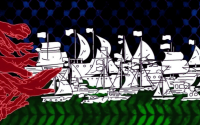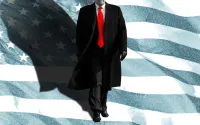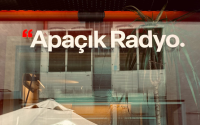"I will not belong to the next government, definitely not," said an emotional Mr Schröder, addressing a trade union conference in Hanover, his home town, to thunderous applause. He also managed a valedictory swipe at two of his biggest adversaries - Tony Blair and George Bush.
Describing Mr Blair ironically as "my British friend", the chancellor said that Mr Blair also had "other friends" too, a barbed reference to the prime minister's stalwart alliance with Mr Bush over Iraq.
The chancellor also attacked the more limited Anglo-Saxon model of the state, warning that Germany under Mrs Merkel should not try to emulate Britain or the US. "I can think of a recent disaster that shows what happens when a country neglects its duties of state toward its people.
"My post as chancellor, which I still hold, does not allow me to name that country. But you all know I'm talking about America," Mr Schröder said to laughter. "People do not want the state in their faces, but they want it at their side."
In the wake of last month's indecisive election, Mr Schröder had tried to hang on to his job. But on Monday he said he was stepping down, allowing his rival to lead the first grand coalition in Germany since the 1960s.
Mr Schröder has said he will take part in formal coalition talks between his Social Democrats (SPD) and Mrs Merkel's Christian Democrats, which start next week. He is now in the curious position of having to persuade his reluctant party to back Mrs Merkel, a woman he ridiculed as not fit to be chancellor.
Since his resignation, there has been growing speculation about what the 61-year-old might do next. Yesterday his spokesman, Bela Anda, angrily denied "libellous" reports that Mr Schröder would cash in on his close friendship with Russia's president, Vladimir Putin, and join the Russian energy giant Gasprom.
Others have suggested Mr Schröder could work for an American bank. There has also been talk of him writing his memoirs, though Mr Schröder, unlike his SPD predecessor, Helmut Schmidt, is not at home in the world of letters.
Until MPs formally elect Mrs Merkel chancellor next month in a secret ballot, Mr Schröder will continue with his old globetrotting job. Last night, Mr Schröder - a passionate supporter of Turkey's EU bid - flew to Turkey for talks with the prime minister, Recep Tayyip Erdogan.
He is off to Paris tomorrow to meet the French president, Jacques Chirac, a fellow Iraq refusenik. Nobody is expecting Mr Schröder to drop in to Downing Street and say goodbye. But Mr Blair will have an opportunity to say goodbye to the man he once called "Gerd" when Mr Schröder joins EU leaders later this month at Hampton Court.
The orphaned son of a cleaning lady - his father was killed in the second world war - Mr Schröder left school at 15. He took evening classes, passed law exams, and joined and led the SPD's youth wing. He became chancellor in 1998, defeating Helmut Kohl, and kept the job for seven years at the head of a red-green coalition.
His record in office was mixed. His biggest success was in foreign policy - pioneering a more assertive role for Germany. His biggest failure was at home, embarking too late on urgently needed reforms.






